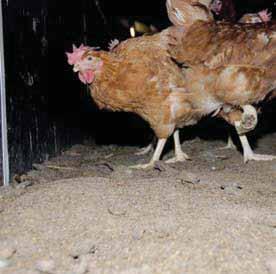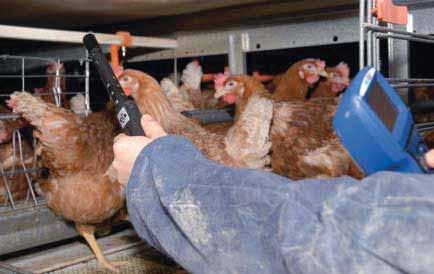
1 minute read
Air


Advertisement
Air
High ammonia and dust levels affect the chickens’ mucous membranes and make them more susceptible to disease. In fact, too much ammonia can even cause blindness in chickens. You can smell ammonia from a concentration of as little as 20 ppm yourself. If you can smell it, the concentration is too high. Other gases like oxygen, carbon dioxide and carbon monoxide have no smell. Imperceptible to humans, excessive concentrations can be harmful to the birds, but also to humans. Ventilation not only brings fresh air into the house, it also removes residues in the air. If you have several poultry houses, you may sometimes notice the hens in different houses doing different things. If the birds in one house are less active than those in another, this may well have
something to do with the climate. Monitor it, or get someone in to do so, and improve your ventilation system if necessary. You can monitor most gases easily yourself using gas detection tubes. The table gives the standard levels for the main gases.
Avoid wet litter
Wet litter is a source of ammonia and leads more quickly to digestive problems, coccidiosis and footpad problems (lameness). Keep the litter dryer by ventilating better (removing the moisture), increasing the fibre content in the feed (result: dryer manure) and stopping spillages of drinking water. Scatter grain so that the hens scratch the litter loose themselves. Concentrations of various gases Gas Standardlevel Oxygen (O2) >21% Carbon dioxide (CO2) < 0.2% (2000 ppm) Carbon monoxide (CO) < 0.01% (100 ppm) (ideally 0) Ammonia (NH3) < 0.002% (20 ppm) Hydrogen sulphide (H2S) < 0.002% (20 ppm) Relative humidity 60-70%copyright protected
When you monitor the house climate, don’t only do so at your own working height but also at the height of the chickens. With cage systems, take measurements at the bottom layer and the top layer. You can see that the litter in this picture has become a hard crust. The litter was originally damp and was obviously not worked enough by the chickens.










